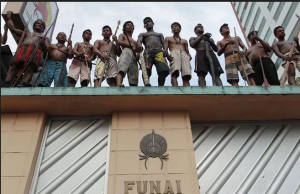In June, 2016, as the impeachment of Dilma Roussef followed its course, it became increasingly evident that one of the strongest motivations of the maneuvers that led to the April parliamentary coup was the interest of many of those supporting impeachment in strangling the ongoing federal investigations into corruption. Perhaps in reaction to this, the “party of law and order”, formed around Operation Car Wash in 2014 (and which has since then to a large extent determined the country’s dynamics of governance) has once again intensified and expanded its operations. In May, two ministers of the interim administration were indicted and in June a third (Tourism) was forced to resign. An important former minister of the two PT administrations was subsequently arrested. [1] New areas of inquiry, including public finding for cultural activities, were opened up as this update was being finalized, Car Wash coordinators have also announced the beginning of Abyss, their 31st operation, which will investigate Petrobrás mega construction contracts in Rio de Janeiro.
In frank contrast with Operation Car Wash’s supposed image of efficiency and judicial rigor, five months elapsed before the mandate of MP Eduardo Cunha (the ex President of the House), who has been accused of involvement with many of the schemes under investigation, was suspended in May. Despite the suspension, Cunha continues to freely maneuver in Brasilia in a quest to avoid his final political death. Ignoring public opinion, the interim president received Cunha for a chat in the official residence in late June.
 The other top issue of the post-impeachment scenario has been the financial bankruptcy of the State of Rio de Janeiro. Public servants have not received salaries since December. Public policies in all areas, including public safety, are being jeopardized and this threatens the public sector’s performance during the Olympic Games (see the New York Times article). A forceful decree declaring a state of disaster has been signed by the interim president, in order to allow for one billion dollars to be rapidly transferred to the state of Rio de Janeiro. Even though these emergency funds will be mainly allocated towards public security, civil policemen and firemen organized a protest in the international disembarking area of the Rio Airport after the decree was made public, with banners reading “Welcome to Hell ” in English.
The other top issue of the post-impeachment scenario has been the financial bankruptcy of the State of Rio de Janeiro. Public servants have not received salaries since December. Public policies in all areas, including public safety, are being jeopardized and this threatens the public sector’s performance during the Olympic Games (see the New York Times article). A forceful decree declaring a state of disaster has been signed by the interim president, in order to allow for one billion dollars to be rapidly transferred to the state of Rio de Janeiro. Even though these emergency funds will be mainly allocated towards public security, civil policemen and firemen organized a protest in the international disembarking area of the Rio Airport after the decree was made public, with banners reading “Welcome to Hell ” in English.
A number of press investigations into this financial crisis show that policy failures in priority areas such as the environment and public security were perhaps aggravated by the current financial disaster, but had their origin in long standing and deeper problems of management and efficiency. It also does not help things that OI, the giant telecom established during the 1990’s privatization wave (and which was pushed by the PT administration into becoming a maverick corporation) two weeks ago resorted to the Brazilian equivalent Chapter 11 in order to avoid a complete meltdown. OI employs 130,000 throughout Brazil and a large percentage of these employees are located in Rio.
The potential sale of OI is attracting a number of international investors (including an Egyptian company). But this, it should be said, is far from exceptional. The economic sections of the Brazilian press daily inform us about mergers and assets for sale across the entire economy. Aligned with the “spirit of time”, the interim Minister of Finance announced that a new round of privatization will begin “as soon as the impeachment process is resolved”. In the ceremony in which the first female president of the National Economic and Social Development Bank (BNDS) assumed her post, the Minister claimed that “everything that can be transferred to the private sector will be sold”.
The interim government: exuberance, paralysis and a very bad sign
While the “law and order” agitation, the Rio crisis and the intense sale of economic assets exhibit a certain exuberance, the actions of the federal interim government have dwindled, alternating between strong announcements aimed at ”making the market happy” and measures that would be qualified as “populism” by the actors now in power, had they been adopted by the previous administration. The Bolsa Família income transfer program was given a raise of 12 percent and the presidency sanctioned a law giving substantial salary increases (ranging from 16 to 42 percent) to federal public servants in the Executive and Legislative branches, the Judiciary and the Public Prosecutor’s Office. By contrast, paralysis or blunt dismantling is what prevails in those areas that are relevant for gender and racial equality, as well as sexual and reproductive rights.
The most drastic example is that a decree has transferred to the President’s cabinet a budget of 4 million dollars dedicated by the Roussef administration to the combined Secretaries of Racial Equality, Human Rights and Women’s policies. No explanation has been given why this decision has been made, and up until now no decision has been taken as to where the Secretary of Women’s Policies will be located in the Minister of Justice’s structure. This means that the new women’s secretary Fátima Pelaes (who expresses staunch anti-abortion views), although formally nominated, has not been very visible lately. This disarray is appalling, however, in face of the events at play in the domain of gender based violence. the first, there were the May collective rapes episodes that provoked a national social uproar. Then, in June, we saw the rapid advance of new legislation by the House (Pl 07/2016), which reforms the 2006 Maria da Penha Law on domestic violence in order to allow police to arrest abusers and also to defer to the police the adoption of protection of measures, thereby cutting the Judiciary out of the process. In the absence of more compelling responses on the part of the Executive Branch, these topics are basically being debated in Congress (see below).
 It is also worth noting that no relevant movement has been registered with regards to the two other secretaries now housed under the Minister of Justice (Human Rights and Racial Equality). By contrast, a very strong sign of how the conservative restoration underway views human rights has materialized during the last week of June, when the a general was suggested by the PSC (the Evangelical Christian party) as president of FUNAI, the executive body that is responsible for the rights and prerogatives of Brazil’s indigenous peoples and which is also housed under the Ministry of Justice. Protests have mushroomed nationally and internationally regarding this move, with their main claim being “the dictatorship is back”. The outcry paid off . On July 6th the announcement has been made that the general’s name has been discarded.
It is also worth noting that no relevant movement has been registered with regards to the two other secretaries now housed under the Minister of Justice (Human Rights and Racial Equality). By contrast, a very strong sign of how the conservative restoration underway views human rights has materialized during the last week of June, when the a general was suggested by the PSC (the Evangelical Christian party) as president of FUNAI, the executive body that is responsible for the rights and prerogatives of Brazil’s indigenous peoples and which is also housed under the Ministry of Justice. Protests have mushroomed nationally and internationally regarding this move, with their main claim being “the dictatorship is back”. The outcry paid off . On July 6th the announcement has been made that the general’s name has been discarded.
On the frontlines in Congress
The dynamics of Congress with regards to the regressive propositions concerning gender, sexual and reproductive rights have not yet recovered the accelerated rhythm of 2015. This slow pace is related to the impeachment process now going on in the Senate. It is also, however, explained by the suspension of MP Eduardo Cunha and his subsequent efforts to avoid the loss of his political rights. The conservative block has lost its principal leadership and is now busy trying to prevent Cunha’s final demise. This does not mean, however, that are no battles underway.
Plenary debates have been organized in the House to discuss and contest what the conservative group has named ”gender ideology” (gender and sexuality as part of comprehensive education and the very use of the term “gender” itself). These debates are related to the proposal presented by the same conservative block to undo Roussef’s presidential decree regarding the right of trans people to use their social identities in all federal public services. As mentioned above, a bill was approved that disfigures the 2006 Maria da Penha law, provoking an immediate reaction by feminists, lawyers and even magistrates. In response to this outcry, the Senate organized a Public Hearing, where the new secretary for women’s policies was seen for the first time in public.
Last but not least, as SPW reported in May, the collective rapes in Rio and Piauí have led immediately to the approval of legislation defining increased criminalization and penalties as the easiest response to meet society’s indignation. As if this was not yet sufficient, the House is also discussing the adoption of additional punitive measures. It is worth noting in this context that the bill aimed at criminalizing the transmission of HIV (which has triggered a national mobilization and major international concern) in early 2015, has, after a long time being tabled, been reintroduced in Congress. The possibility that it now may move along at a faster peace is not out of the question, among other reasons because the Representative who proposed the bill is now the interim minister of Social Development.
Civil society: In brief
 In June, two episodes captured the attention of activists, social networks and mainstream media itself. The Orlando tragedy reactivated national and international attention to homophobic and transphobic hate murders in Brazil (NYT link). This gave visibility to the small city of Santaluz in Bahia, where Edivaldo Moreira e Geovan Bandeira, gay public school professors, were brutally murdered, as an unexpected model for solidarity and respect for sexual diversity (Sonia Corrêa and Fabio Grotz report in Portuguese). Last but not least, heated debates erupted around prostitution, opposing female and trans sex workers activists and anti–prostitution feminist groups and individuals. The SPW plans to examine this question in more depth in forthcoming articles on Brazil.
In June, two episodes captured the attention of activists, social networks and mainstream media itself. The Orlando tragedy reactivated national and international attention to homophobic and transphobic hate murders in Brazil (NYT link). This gave visibility to the small city of Santaluz in Bahia, where Edivaldo Moreira e Geovan Bandeira, gay public school professors, were brutally murdered, as an unexpected model for solidarity and respect for sexual diversity (Sonia Corrêa and Fabio Grotz report in Portuguese). Last but not least, heated debates erupted around prostitution, opposing female and trans sex workers activists and anti–prostitution feminist groups and individuals. The SPW plans to examine this question in more depth in forthcoming articles on Brazil.
English review by Thaddeus Blanchette
Main image: May 2016 Piauí Magazine cover
Last photo: Santaluz mourns Edivaldo Moreira and Geovan Bandeira

